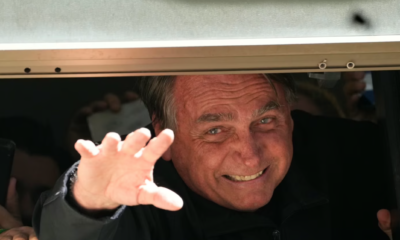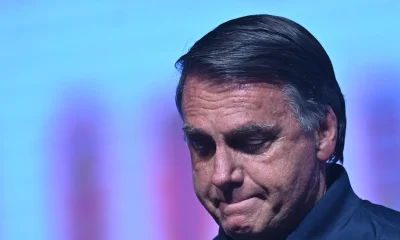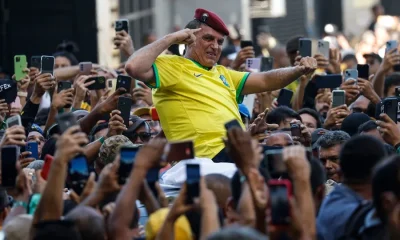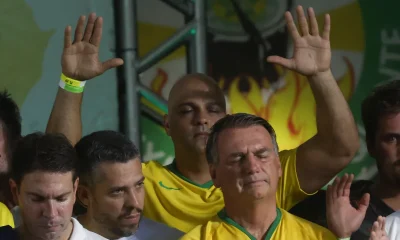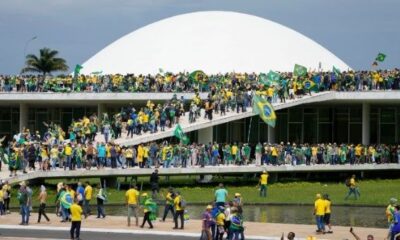International
Brazil seeks arrest of Bolsonaro ally over Brasilia riots
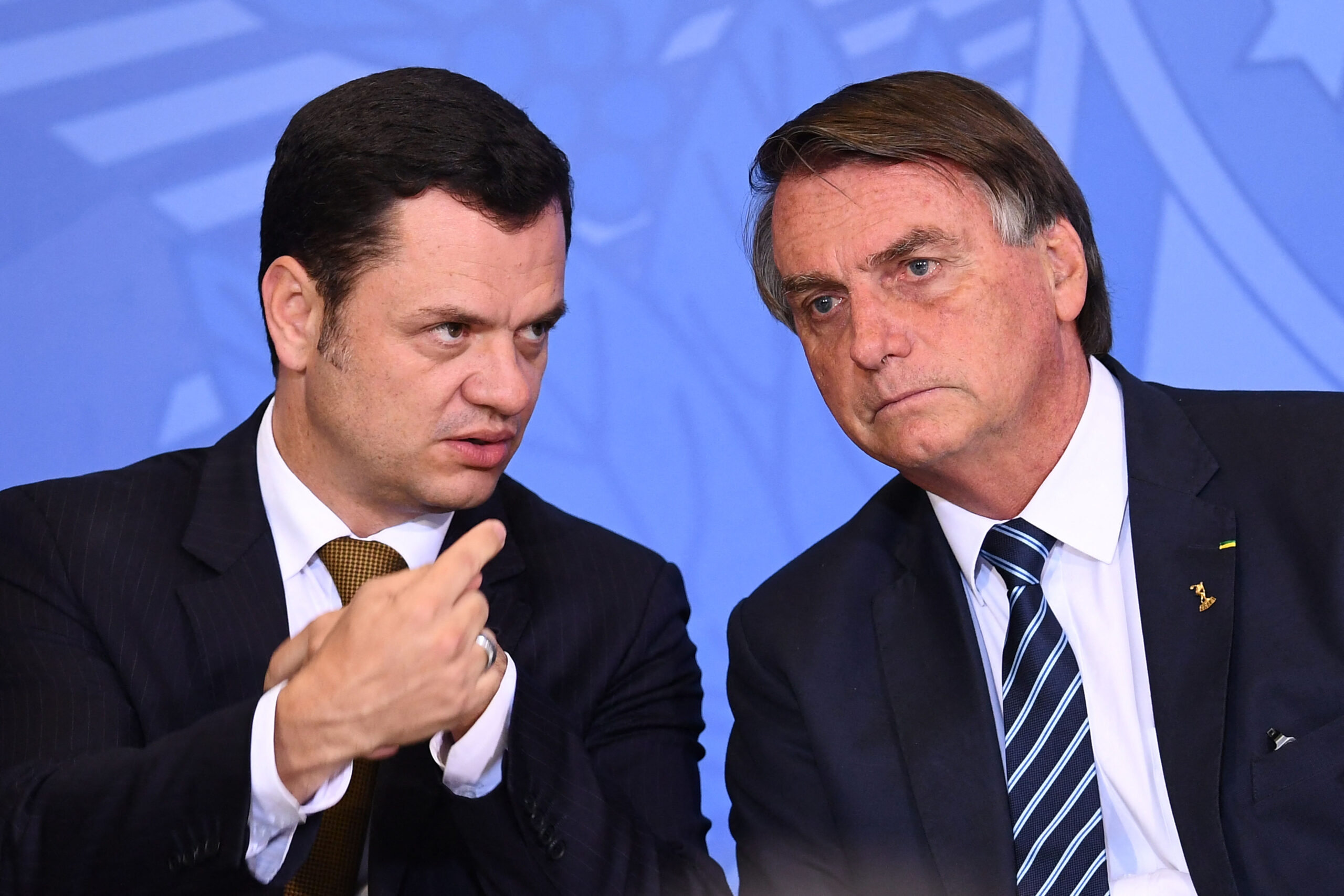
January 11 | By AFP | Florian Plaucheur with Louis Genot in Rio de Janeiro |
Brazilian authorities seeking to punish the mob that stormed the halls of power in Brasilia issued arrest warrants Tuesday for two former senior officials, one of them a close ally of far right ex-president Jair Bolsonaro.
One of them is Anderson Torres, who used to be Bolsonaro’s justice minister and lately served as security chief in the capital.
He was fired after Sunday’s stunning violence, which was reminiscent of the January 6, 2021 insurrection in Washington, and brought global condemnation.
Anderson’s failure to act as thousands of Bolsonaro supporters overran congress, the presidential palace and the supreme court is “potentially criminal,” judge Alexandre Moraes of the Supreme Court said.
He also issued an arrest warrant for Fabio Augusto, who led the military police in Brasilia and was also removed from his job after Sunday’s mob violence. News reports said he is already in custody.
“Brazilian democracy will not be struck, much less destroyed, by terrorist criminals,” the judge wrote in his decision.
Torres was on vacation in the United States on Sunday as the mob ran amok. On Tuesday he denied any complicity in the events and said he will return to Brazil and defend himself.
Bolsonaro has also been in the United States since the end of December, skipping the inauguration of successor Luiz Inacio Lula da Silva.
On Tuesday, Bolsonaro left the Florida hospital where he had been receiving treatment for intestinal problems stemming from a stabbing in 2018.
Most detainees released
The security forces in Brasilia have come under stinging attack over how they responded initially to the riot. Video posted on social media showed some of them filming the violence rather than intervening to halt it.
Justice Minister Flavio Dino said around 50 arrest warrants had been issued for people not caught in the act of pillaging and for others not present but accused of organizing the attack.
Police have arrested more than 1,500 people so far but said on Tuesday that “599 people were released, mostly old people, people with health problems, the homeless and mothers with children” on humanitarian grounds.
Most of the arrests took place on Monday as police cleared protest camps set up in the capital.
Lula had condemned “terrorist acts and criminal, coup-mongering vandalism” when he returned to work at the pillaged presidential palace on Monday.
But on Tuesday he said “Brazilian democracy remains firm,” in a post on Twitter.
“Let’s recover the country from hatred and disunity,” added the 77-year-old former trade unionist, who took office on January 1 for his third term as president after defeating Bolsonaro in the deeply divisive election.
Police said 527 people remain detained while others were being processed.
Those that were released were taken on buses to a bus station from where they would be able to return to their home regions.
From one of the buses, passengers shouted: “Victory is ours!” Some people put their arms outside the vehicles with clenched fists — a symbol of resistance — or making the “V” victory sign.
Other detainees were taken to police stations to then be transferred to the Papuda prison complex, an AFP reporter said.
‘Humiliation’
“Now we’re going to rest and prepare ourselves for another battle because if they think they will intimidate us, they are very wrong,” Agostinho Ribeiro, a freed Bolsonaro supporter, told AFP.
He said the detainees’ treatment at a police gymnasium where they were held had been humiliating and compared it to a Nazi concentration camp, while blaming the rioting on left-wing “infiltrators.”
Hundreds of soldiers and police mobilized to dismantle an improvised camp outside the army’s headquarters in Brasilia on Monday.
There, some 3,000 Bolsonaro supporters had set up tents — used as a base for the sea of protesters who ran riot for around four hours on Sunday.
Bolsonaro has alleged his electoral defeat was due to a conspiracy against him by Brazil’s courts and electoral authorities.
Lula, who previously led Brazil from 2003 to 2010, met with the leaders of both houses of Congress and the chief justice of the Supreme Court on Monday.
International
Claudia Sheinbaum: Operation Against ‘El Mencho’ Was Based on Pending Arrest Warrants

Mexico’s President Claudia Sheinbaum on Wednesday rejected claims that the military operation that resulted in the death of Nemesio Oseguera Cervantes, known as “El Mencho,” leader of the Jalisco New Generation Cartel (CJNG), was carried out under pressure from the United States government.
Sheinbaum explained that the deployment of federal forces was aimed at executing outstanding arrest warrants against Oseguera Cervantes, who was considered one of the most wanted criminals in both Mexico and the United States.
“That was not the objective (to ease pressure from the United States). It is very important, and I want to repeat it. This individual had an arrest warrant, or several,” Sheinbaum said, referring to the operation conducted on February 22.
According to the president, the initial goal was to capture Oseguera Cervantes, but military forces responded after coming under attack during the intervention.
“The operation was to detain him. The problem is that they were attacked — the Secretariat of National Defense — and they responded at that moment,” she said.
The president insisted that the action was not carried out in response to external demands, although she acknowledged intelligence cooperation with the United States.
“It was not done in any way because of pressure from the United States, not at all. Of course, there was intelligence information from the United States that was used specifically,” she concluded.
International
Spain Denies Any Agreement to Cooperate with U.S. Military in Iran Operations
International
White House Says Spain Agrees to Cooperate with U.S. Military After Trump Threatens Trade Embargo

White House Press Secretary Karoline Leavitt said Wednesday that Spain has agreed “in recent hours” to cooperate with the U.S. military, following President Donald Trump’s threat to impose a trade embargo on Madrid.
Trump had warned of potential commercial measures after Spain reportedly refused to allow the Pentagon to use facilities at Spanish military bases for operations related to Iran.
“With respect to Spain, I think you heard the president’s message yesterday loud and clear, and I understand that in recent hours they have agreed to cooperate with the United States military,” Leavitt said during a press briefing.
She added that the U.S. military is currently coordinating with its counterparts in Spain. However, the president expects broader support.
“The president expects that all of Europe, all of our European allies, of course, will cooperate in this important mission — not only for the United States, but also for Europe,” Leavitt said.
Her remarks came in response to questions about Spain’s position and its role as a U.S. ally amid rising tensions surrounding operations involving Iran.
-

 International4 days ago
International4 days agoIran Reports 201 Dead, 747 Injured After U.S. and Israeli Strikes
-

 International3 days ago
International3 days agoBrazil’s Supreme Court Rejects Bolsonaro’s Bid for House Arrest
-

 International4 days ago
International4 days agoPope Leo XIV Urges End to ‘Spiral of Violence’ in Middle East
-

 International5 days ago
International5 days agoSecurity Council to Hold Emergency Meeting on Middle East Crisis
-

 International3 days ago
International3 days agoAnti-ICE Billboard Campaign Targets Immigration Spending in 31 U.S. Cities
-

 Sin categoría5 days ago
Sin categoría5 days agoTrump: ‘We Think It’s True’ Amid Claims Iran’s Supreme Leader Was Killed
-

 International2 days ago
International2 days agoSpain’s Prime Minister to Address Nation Amid Trump’s Trade Threats
-

 International3 days ago
International3 days agoTrump Warns of ‘Major Wave’ of Attacks as Iran Conflict Escalates
-

 International3 days ago
International3 days agoMexico Calls for Immediate Probe After National Dies in ICE Custody
-

 International14 hours ago
International14 hours agoWhite House Says Spain Agrees to Cooperate with U.S. Military After Trump Threatens Trade Embargo
-

 International3 days ago
International3 days agoBolivia Orders Three Investigations Into Deadly Military Plane Crash
-

 International2 days ago
International2 days agoNew York Announces First 2,000 Seats in Universal 2-K Program
-

 Central America3 days ago
Central America3 days agoPanama Canal Monitoring Trade as Middle East Conflict Disrupts Shipping
-

 International14 hours ago
International14 hours agoSpain Denies Any Agreement to Cooperate with U.S. Military in Iran Operations
-

 International2 days ago
International2 days agoWarner Bros. Developing First ‘Game of Thrones’ Movie With ‘Andor’ Writer
-

 Central America2 days ago
Central America2 days agoGuatemala’s Attorney General Fails in Bid for Top Court Seat Amid Corruption Allegations
-

 Central America14 hours ago
Central America14 hours agoNicaragua Held Responsible for Harassment of Opposition Prosecutor and His Family
-

 International13 hours ago
International13 hours agoClaudia Sheinbaum: Operation Against ‘El Mencho’ Was Based on Pending Arrest Warrants































